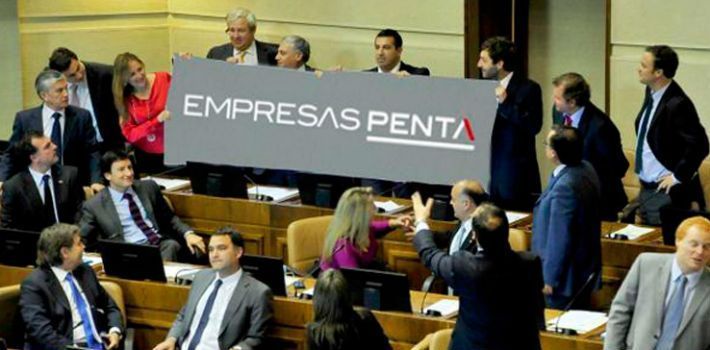
EspañolAs Santiago’s streets empty for the Chilean summer, the country’s political landscape is far from calm. The Pentagate case, a far-reaching corporate campaign finance scandal, is heating up. The story broke in September 2014, but we’d only seen the tip of the iceberg. The furore has grown to disturbing proportions, spreading out from its epicenter, the opposition Independent Democratic Union party (UDI).
The Roman emperor Vespasian once pronounced that pecunia non olet, money doesn’t stink, no matter how it’s earned. But there’s something decidedly fishy about the lack of transparency in Chile’s system of campaign donations, an issue which is by no means new or the exclusive preserve of one end of the political spectrum. The law has left too many loopholes open for unethical conduct. Those implicated have cited a permissive legal framework as justification for their unaccountable funding, avoiding any reflection on whether what they did was immoral.
The lies — or “involuntary errors” as UDI Senator Ena von Bauer prefers to call them — won’t fade out of the public eye. For at stake is a history of misdeeds by Chile’s political class, borne out of an unhealthy arrogance among those who hold public office. Many elected officials forgot about the people they were supposed to represent.
Sociologist Eda Cleary offers a reminder of the concept of “infiltration schemes,” which I believe captures the dynamics of these kind of scandals. This phenomenon arises when “democratic mechanisms of dispute resolution, such as Parliament or Congress, become tools for private interests, either as personal gain or the party’s.” Politicians then use this legal framework — and twist it if need be — to benefit the lobbies they represent.
Chile’s democratic institutions have been tarnished, while politicians across the board have lost any ethical credibility they had left.
The Pentagate scandal has been a firm and unpleasant reminder of Chilean political reality. The country’s democratic institutions have been tarnished, while politicians across the board have lost any ethical credibility they had left.
If we accept Aristotle’s notion of politics, we can’t separate it from ethics and morality, from virtuous acts. Humans are by nature moral beings, as free and rational individuals. Moral virtue grows from our rational understanding imbued with prudence, and it’s all about habit: we achieve it by repeatedly doing the right thing for its own sake. Morality come from the Latin word moralis, which precisely means customary activity, the repetition of acts. Moral judgement allows us to recognize the norms and activity that constitute virtuous conduct.
By linking Pentagate to these reflections on morality, virtue, and politics, we can see that Chile is home to a new way of doing politics, marked by a repetition of acts that have become a habit. A new warped moralis is ingrained among Chile’s political actors.
Witness the striking frivolity with which politicians requested illicit campaign contributions, through brief, informal messages, complete with jokes and slang. It was normal, even natural, for them to behave in that way.
This grotesque relationship between money and politics — this new habit — only came to light by chance. As Cleary puts it, “when intrigue succeeds in remaining under wraps, it adopts the appearance of normality, and the lie emerges as truth.”
One could have expected a cathartic episode from those involved, as in the end of Greek tragedies, where evil is expunged and equilibrium is restored. Instead, we’ve only seen vague promises of atonement, and muted admissions of partial wrongdoing. The long-term consequences of this strange disease among Chile’s politicians are yet to be seen — only one affected individual has resigned. The next round of elections in 2017 will be the litmus test.
For now, Pentagate has clearly been behind a dramatic slump in support for the opposition conservative coalition Alianza. But as the judicial investigation continues, we can also exercise our own judgement, and evaluate in the cold light of day the legal and moral framework governing Chile’s political class. We can also reflect on our own conduct.
If Chile’s voters reelect the same people whose moral character they repudiate, then they will get the representatives they deserve. Unless we choose better leaders, we lose the right to complain or be shocked by their habits.
Translated by Daniel Duarte. Edited by Laurie Blair.
 Versión Español
Versión Español












